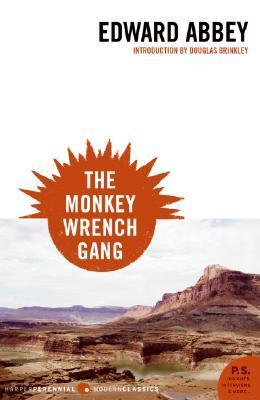
Part of Series
Ed Abbey called The Monkey Wrench Gang, his 1975 novel, a "comic extravaganza." Some readers have remarked that the book is more a comic book than a real novel, and it's true that reading this incendiary call to protect the American wilderness requires more than a little of the old willing suspension of disbelief. The story centers on Vietnam veteran George Washington Hayduke III, who returns to the desert to find his beloved canyons and rivers threatened by industrial development. On a rafting trip down the Colorado River, Hayduke joins forces with feminist saboteur Bonnie Abbzug, wilderness guide Seldom Seen Smith, and billboard torcher Doc Sarvis, M.D., and together they wander off to wage war on the big yellow machines, on dam builders and road builders and strip miners. As they do, his characters voice Abbey's concerns about wilderness preservation ("Hell of a place to lose a cow," Smith thinks to himself while roaming through the canyonlands of southern Utah. "Hell of a place to lose your heart. Hell of a place... to lose. Period"). Moving from one improbable situation to the next, packing more adventure into the space of a few weeks than most real people do in a lifetime, the motley gang puts fear into the hearts of their enemies, laughing all the while. It's comic, yes, and required reading for anyone who has come to love the desert.
Author

Edward Paul Abbey (1927–1989) was an American author and essayist noted for his advocacy of environmental issues, criticism of public land policies, and anarchist political views. Abbey attended college in New Mexico and then worked as a park ranger and fire lookout for the National Park Service in the Southwest. It was during this time that he developed the relationship with the area’s environment that influenced his writing. During his service, he was in close proximity to the ruins of ancient Native American cultures and saw the expansion and destruction of modern civilization. His love for nature and extreme distrust of the industrial world influenced much of his work and helped garner a cult following. Abbey died on March 14, 1989, due to complications from surgery. He was buried as he had requested: in a sleeping bag—no embalming fluid, no casket. His body was secretly interred in an unmarked grave in southern Arizona.
